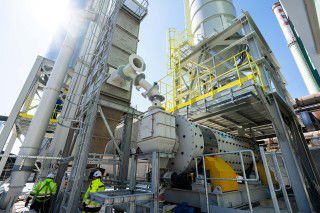The first trial melt has been completed as part of the innovative Cement 2 Zero project, which aims to develop the world’s first zero-emissions cement on an industrial scale. The collaborative project is seeking to advance the decarbonisation of the construction, cement and steel sectors by ensuring the process can be scaled up from laboratory to pilot plant. Partner organisations include the Materials Processing Institute, University of Cambridge, CELSA Steel UK, Atkins, Balfour Beatty, Day Aggregates and Tarmac.
The trial melt was carried out using the Materials Processing Institute’s 7t electric arc furnace (EAF) on its Teesside campus. Three further melts will be carried out using the Institute’s EAF. Once substantially trialled, developed and de-risked, a series of further industrial-scale trial melts will be held at CELSA’s EAF in Cardiff. The process was invented by Dr Cyrille Dunant at the University of Cambridge, who discovered that the chemical composition of used cement is virtually identical to that of the lime-flux used in conventional EAFs.
Cement 2 Zero uses recycled cement as the flux in the electric steel recycling process, the by-product of which when cooled and ground produces Portland cement clinker that can be blended to make ‘zero-emissions’ cement. The pilot-scale EAF experiments use the flux material containing end of life recycled cement processed by Day Aggregates and international mining and minerals group LKAB, using a variety of scrap steel inputs provided by CELSA.
The EAF melts are being undertaken by the institute in its Normanton plant. The testing of melt procedures and slag cooling offers a greater understanding of creating an end-product that could be produced on an industrial scale, with Tarmac beginning the process of testing the new clinker to understand the grinding properties and assess key performance criteria of the new material.
The Cement 2 Zero project secured GBP6.5m (US$7.9m) of government funding from UK Research and Innovation (UKRI) as part of the Transforming Foundation Industries challenge.
Chris McDonald, chief executive officer at the Materials Processing Institute, said, “Until now the research has been at a laboratory scale. The Institute having a 7t EAF has enabled this next scale up phase of development and testing to take place. The preliminary findings are encouraging in terms of providing the project team with a much greater understanding of the process and how it can be improved and scaled. The initial trial melt is a critical part of the project and a huge step towards creating a more efficient, environmentally friendly, and resource conscious manufacturing process contributing to the decarbonisation of the construction, cement and steel sectors.”
